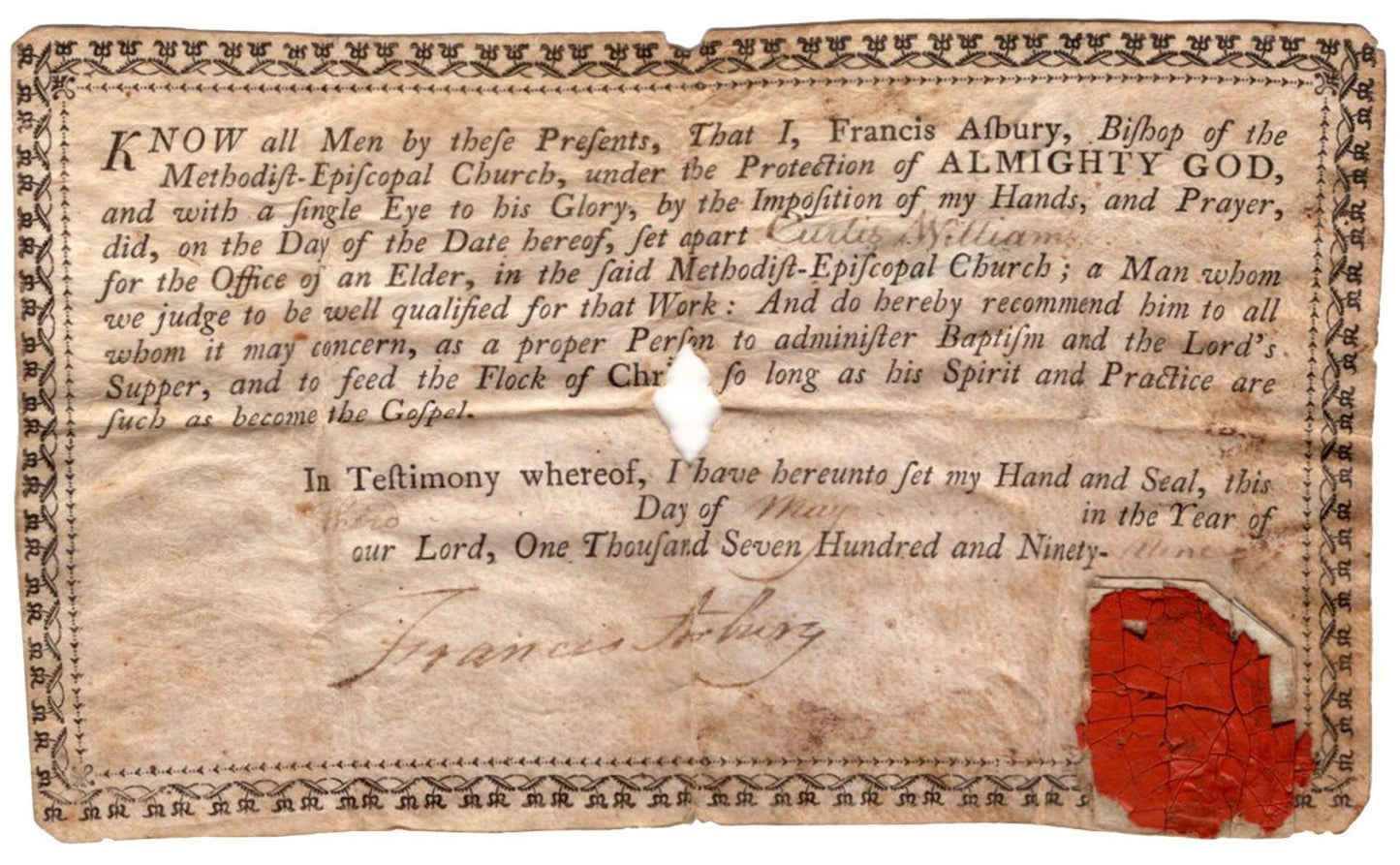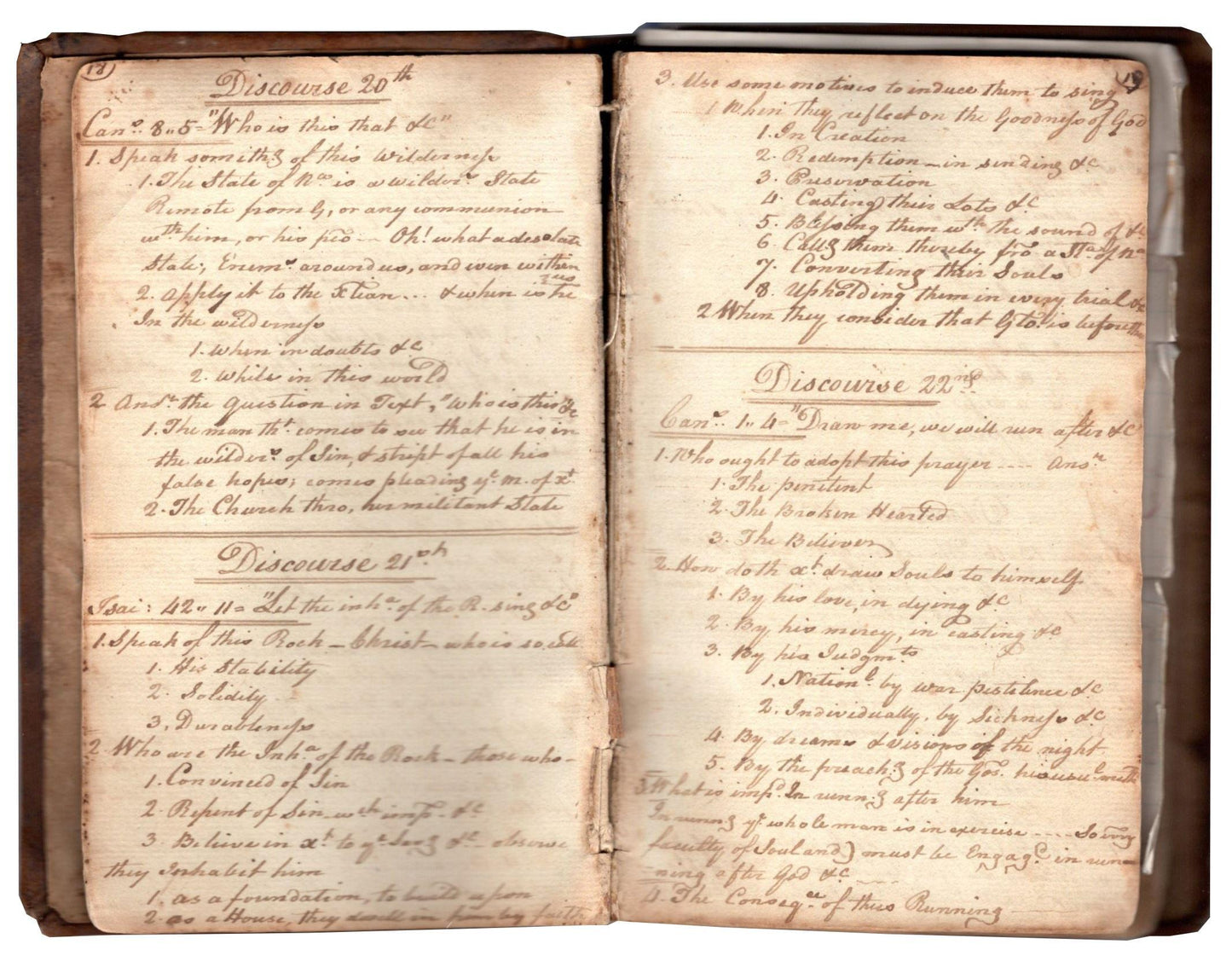Specs Fine Books
1799 FRANCIS ASBURY. Rare Ordination Certification and Manuscript Sermons of Early Virginia Methodist!
1799 FRANCIS ASBURY. Rare Ordination Certification and Manuscript Sermons of Early Virginia Methodist!
Couldn't load pickup availability
The present group of important Methodist Americana consists of two items:
First, a very desirable Bishop Francis Asbury signed ordination certificate for Curtis Williams as Elder in the Methodist Episcopal Church.
The document, per usual, is partially printed and partially handwritten, then autographed by Francis Asbury. Dated to May 3, 1799, it measures 5.875" x 3.5 and has the expected folds, general toning and soiling. The original wax seal is present and it has a non-structurally compromising diagonal hole cut in the center as shown.
Second, is an original manuscript notebook of sermons preached by Curtis Williams. It includes 27 discourses.
Texts covered include: Isaiah 12.6 "Cry out and Shout &c;" Zechariah 9.12 "Turn ye to ye stronghold;" Jeremiah 22.29 "hear the word of ye Lord;" Jeremiah 8.20 "The harvest is past;" Revelation 1.7 "Behold He cometh;" Romans 12.11 "Fervent in spirit;" I Corinthians 9.27 "This one thing I do;" Psalms 9.15 "Blessed are they that know;" Psalms 144.15 "Happy is that people;" Luke 13.8, 9 "And he answered and said;" Deuteronomy 7.22 "The Lord thy God will put out those nations before thee by little and little;" Nahum 1.7 "The Lord is good, a stronghold in the day of trouble;" Philippians 3.8 "I count all things but loss;" II Samuel 14.14 "For we must needs die &c;" John 10.27-28 "My sheep hear my voice;" Isaiah 12.2 "Behold God is my Salvation;" Canticles 8.5 "Who is this that;" Isaiah 42.11 "Let the inhabitants of the rock sing;" Canticles 1.4 "Draw me, we will run after;" Jeremiah 13.16 "Therefore, give glory;" Isaiah 9.6 "And his name shall be wonderful Counsellor;" Isaiah 65.1 "I said, behold me, behold me;" Jeremiah 6.16 "Thus saith the Lord, stand ye;" II Samuel 12.23 "Wherefore should I weep;" Psalms 146.8 "The Lord openeth the eyes;" Revelation 14.13 "Blessed are the dead;" Exodus 32.26 "Who is on the Lord's side;" etc.
This is then followed by a set of moving reflections on the death of Curtis Williams by his wife, Mary Ann Williams. Then there are genealogical records of the Williams family. The remainder is blank.
The notebook contains 116 pp. total, measures, 4.25" x 6.5", and is in a general good state with scuffing, front board partially detached, and edges stains and foxing to sheets; complete without loss.
Francis Asbury (1745-1816) was born in England and became an evangelical at an early age. He worked for a local family and then made metal goods. John Wesley selected Asbury as a traveling lay preacher for the Methodist cause when Asbury was 22. In 1771, he volunteered to travel to British North America, where he began preaching in New York and Pennsylvania. At the beginning of the Revolutionary War, he was one of only two British Methodist lay ministers in America. He initially attempted to remain neutral, but this position placed his parishioners in an untenable position. In 1784, John Wesley named Asbury and Thomas Coke as co-superintendents of Methodism in the United States. For the next 32 years, Asbury led the Methodists in America. In 1792, he established a General Conference, where delegates from many areas met to conduct the business of the denomination. He rode an average of 6,000 miles per year, preaching virtually every day to audiences large and small. Under his administration, the church grew from 1,200 to 214,000 members and 700 ordained preachers. After preaching his last sermon in Richmond, Virginia, in March 1816, he died a week later in Fredericksburg.
Curtis Williams (1766-1824) was taking into full connection and was already a deacon in 1796 in the Methodist Episcopal Church and then ordained as an elder in 1799 and served churches in Virginia, Maryland, and the District of Columbia. His ordination is recorded in the published Journal of Francis Asbury. By 1802, Asbury is visiting Williams with some regularity and reports in his journal that the work in the Frederick Circuit was expanding and growing under Williams' ministry. While visiting Williams there, he urged him to return to preaching in the public square rather than just in the "church," suggesting he begin regular sermonizing on the court-house steps near the town square.
Share




